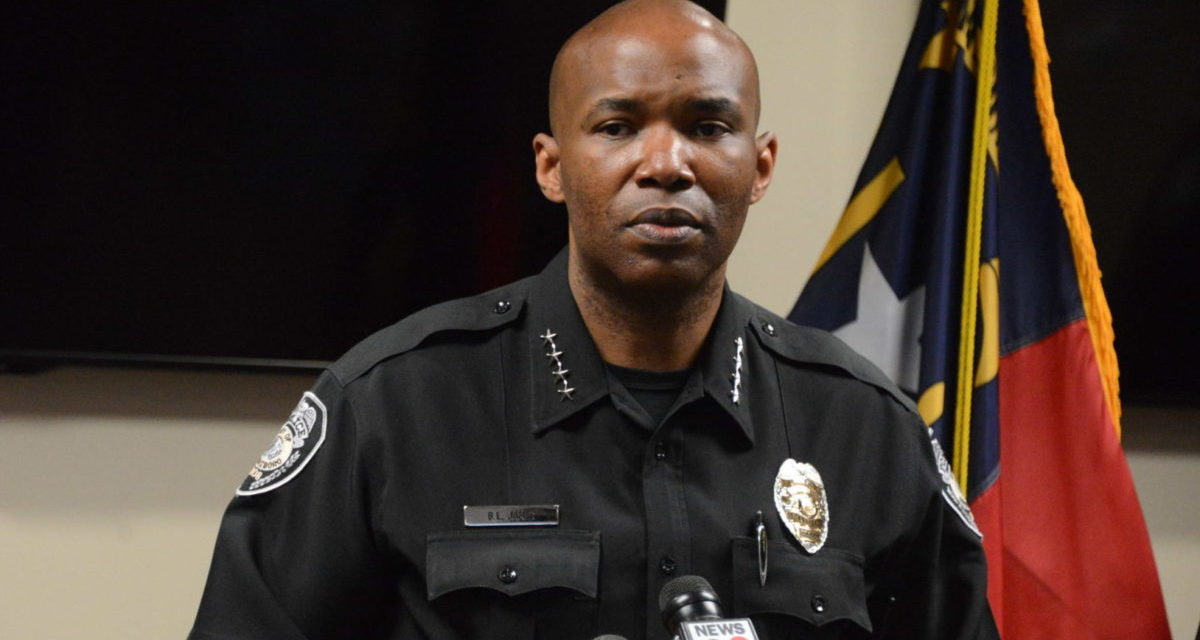On Monday, June 8, Greensboro Police Chief Brian James announced some modifications to Greensboro Police Department (GPD) policy following the concerns expressed by many people in the community.
At a press conference James said that the GPD does not teach or train its officers to use chokeholds or strangleholds and prohibits the use of force that restricts breathing or disruption of blood flow, but the GPD went one step further and as of today prohibits those restraint methods.
He said, “Let me be clear those methods were never authorized, but this morning we put in a policy specifically addressing chokeholds to assure that that language is clear and so the public knows that we do not authorize chokeholds.”
Another policy that the GPD is clarifying has to do with the actions of other police officers.
James said, “This morning, GPD modified its policy to specifically require that any time an officer witnesses an excessive use of force, they have a duty to intervene verbally and/or physically to interrupt that act, and they must notify their supervisor so that the appropriate administrative and/or criminal investigation can begin.”
James noted that Greensboro police officers are trained to “employ de-escalation techniques” whenever possible and when they have to resort to force to use the least amount of force necessary.
James said that he had been in contact with the Greensboro Police Officers Association about providing enhanced access to mental health and counseling services for officers and that the department plans to add a policy requiring a psychological assessment every five years.
James said that currently an officer receives a psychological assessment when hired and after being involved in a critical incident such as a shooting, but he said he wanted to expand that to have officers receive an assessment every five years and also provide enhanced access for officers to receive counseling if needed.
James said, “When we receive community concerns we are always willing to review our policies and analyze whether changes are in order, we will continue to listen and engage in productive dialogue into the future.”


How many of you heard about Tony Timpa, a Dallas, TX resident who called 911 to report he was off his schizophrenia medication. Three police officers put their hands and knees on his back. He cried out that he couldn’t breath. The policemen laughed and made jokes as he struggled to breath, his face in the grass.
Unresponsive, his eyes glazed and grass in his mouth, the three police officers pushed on him and laughed saying, “Time to wake up and go to school.” Paramedics arrived and after waiting four minutes they finally gave the unresponsive Tony a tranquilizer shot, place him on a gurney and put him in their ambulance.
Several minutes later, on of the paramedics notified the police officers that Timpa was dead. One of the officers asked “Did I kill him?” The others laughed and jokingly replied, “When will that turn into ‘did we kill him’?” They acted as though it was funny. The Dallas District Attorney dropped all charges and the Dallas PD withheld the video until recently. All three officers are still employed by the Dallas PD.
The public did not respond to Timpa’s death while in custody with city wide, or state wide or national protest marches, arson, looting or beat downs.
What does this have to do with the Greensboro Police Department clarifying it’s policy?
The city now has a minimum wage of $15 per hour for city employees. They pay the police slightly more at about $18 an hour. The job requires a drivers license, US citizenship, a GED, and a 10th grade reading level. That is basically it, and I am not kidding. They do not even need a clean criminal record anymore, although you still cannot be a felon.
So society values cops at $18 an hour with minimal requirements and yet expects them to operate as though they were legal, medical, and mental health experts. I know we pay lawyers, doctors, and psychologists much, much more and they only have to do one job. Maybe if the requirements and pay were commensurate with society’s expectations, you could have cops who were able to live up to those lofty goals.
No. Instead, let’s just bash them all, treat them all like they are rotten, and call for their abolition as an entire unit. Last I heard, basing judgement of an entire group based on the actions of a few was called stereotyping or discrimination. I thought that was frowned upon nowadays. Just not for them, huh?
Remember that you get what you pay for.
How is ANY of that relevant to the article, the City of Greensboro, the State of NC, or even the southeast?
I commend GPD for taking the actions noted in the article. This is what should be done. Disbanding police departments is NOT the way to handle the actions of a few (very few) police officers. I applaud our officers; everytime I see an officer, I say thank you for all you do. Respect them, obey them, and let them know Police Lives Matter (PLM).
Chief, I don’t think anyone wants your job. You and your men and women cannot do your job because feckless politicians everywhere, not just our city council. The LEFT wants you marginalized so that they own the streets, and peoples lives; then they can offer a savior (Adolf?). You have to pacify every critic with B.S. just to try to do your job. Good luck.!
In the memory of Tony Timpa RIP:
https://www.resthavenfuneral.com/obituaries/Anthony-Timpa/#!/Obituary